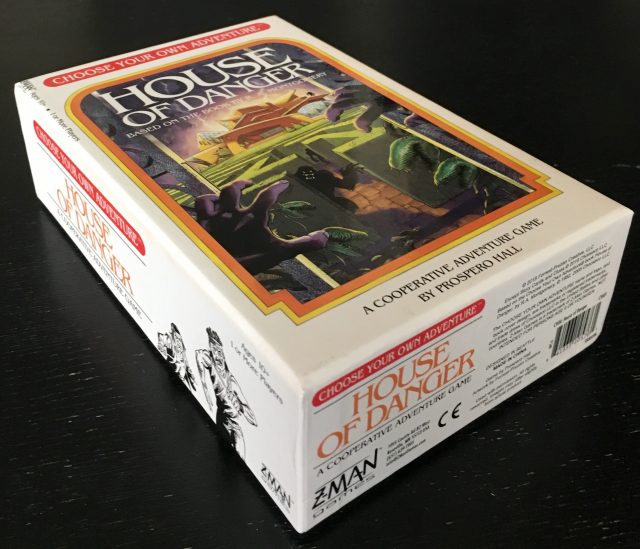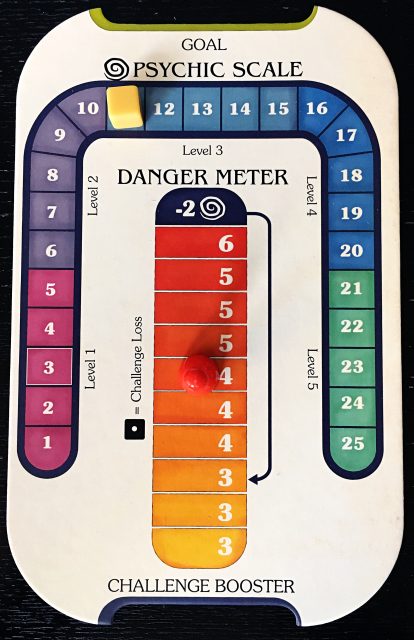Of course, humans are storytellers, always have been. Roleplaying games have been around more than forty years now, but RPGs, even in tabletop form, tend to take up a lot of space and time and preparation. So somewhere along the way people figured out that, if you were willing to concentrate on the story without worrying about details like armor class and initiative, you could have a storytelling game that may lack the intensity and immersiveness of the best RPG experiences, but still brought The Fun. The trick was how to impose enough of a structure to give the players interesting decisions to make without dumping them into a sandbox and telling them to make things up as they went.
 Thankfully, designers already had a template to go by: the Choose Your Own Adventure series by Bantam books. The first book in the series, The Cave of Time, came out in 1979, and was the first in a long and successful line of books which put readers into exciting (if somewhat chaotic) situations and forced them to make choices. Forty possible endings! And, if you were like me, you went through the book forty times just to find out what each ending was. Then in 1981 the much-beloved Fighting Fantasy book series began, which added RPG elements.
Thankfully, designers already had a template to go by: the Choose Your Own Adventure series by Bantam books. The first book in the series, The Cave of Time, came out in 1979, and was the first in a long and successful line of books which put readers into exciting (if somewhat chaotic) situations and forced them to make choices. Forty possible endings! And, if you were like me, you went through the book forty times just to find out what each ending was. Then in 1981 the much-beloved Fighting Fantasy book series began, which added RPG elements.
The earliest CYOA-type tabletop game I know is Sherlock Holmes: Consulting Detective, from 1981, and not only does it still stand up, it remains so popular that it has recently been reprinted in all its Victorian glory. Then you have Tales of the Arabian Nights, from 1985, republished about ten years ago by ZMan–unpredictable, random, and, with the right group, hilarious. Whovians have been enjoying the Doctor Who Solitaire Story Game since 2009–but as the title implies, it’s a solo game in the style of the Fighting Fantasy books.
The last couple of years have brought on a slew of games which could essentially be called “Choose Your Own Adventure” games, which have gone back to basic principle of The Cave of Time: players read a block of text with a situation and are then presented with two or more choices, each of which sends the game in a different direction.
Some recent designs (Fallout, Gloomhaven, This War of Mine) incorporate CYOA to greater or lesser extent. In each of those cases, CYOA adds to the immersion and help shape the game’s narrative, but there are other mechanics fighting for your attention.
Seven other recent games put CYOA front and centre:
So basically everyone and her uncle Johnny is putting out CYOA games except the original CYOA people…until now, that is.
 That’s right. Someone finally figured out that if you bought the IP you could create an actual, Brand Name, “Choose Your Own Adventure” game. That someone worked at ZMan Games, and now we have House of Danger, based on the 1982 book from the original series–no going back to read it now, cheaters! And it even comes in a box that looks like the original books (except–sidebar–Tau Leader games did it three years ago with Deep Space D-6, a pretty awesome solo space-dice game).
That’s right. Someone finally figured out that if you bought the IP you could create an actual, Brand Name, “Choose Your Own Adventure” game. That someone worked at ZMan Games, and now we have House of Danger, based on the 1982 book from the original series–no going back to read it now, cheaters! And it even comes in a box that looks like the original books (except–sidebar–Tau Leader games did it three years ago with Deep Space D-6, a pretty awesome solo space-dice game).
The game plays out like the books. Players are psychics troubled by weird dreams who decide to go find out what’s causing them. (Don’t try that at home, kids.) There are five chapters, each one building on the previous but playable in separate sessions. Each chapter consists of a small deck of cards which act like the pages in the CYOA books: text followed by choices. They’ve added on a very simple skill-check system and equipment you can find and use to make those skill checks easier. Succeeding at skill checks usually gets you more gear or opens up other areas to explore; failure increases the Danger level (which determines the difficulty of skill checks) and ultimately can downgrade your Psychic ability. Lose enough Psychic ability and you lose the game. You can also gain Psychic ability through various means, which makes things easier for you. That’s about it.
Where does House of Danger fit on the spectrum of CYOA games? The game’s age range is 10+, but the rules are so simple that any kid old enough to read and handle the sometimes scary situations can play it fine. I’ve played T.I.M.E. Stories with an eight-year-old, and House of Danger is simpler.
 House of Danger has no rules to regulate player interaction, unlike Legacy of Dragonholt or T.I.M.E. Stories, so it’s definitely possible for one player to just boss everyone else around. Luckily, the game seems pretty forgiving–it’s quite possible to succeed even if you make bad choices or fail lots of checks. There’s also no perma-death: if you reach The End prematurely (ie, end up dead in a ditch) the game merely backs you up to a recent decision point–which, face it, you were going to do anyway, weren’t you?
House of Danger has no rules to regulate player interaction, unlike Legacy of Dragonholt or T.I.M.E. Stories, so it’s definitely possible for one player to just boss everyone else around. Luckily, the game seems pretty forgiving–it’s quite possible to succeed even if you make bad choices or fail lots of checks. There’s also no perma-death: if you reach The End prematurely (ie, end up dead in a ditch) the game merely backs you up to a recent decision point–which, face it, you were going to do anyway, weren’t you?
ZMan has promised that if House of Danger does well enough, they’ll consider making some expansions, which would be a Good Thing since replayability is limited. if you’re looking for a breezy and relatively inexpensive game that’s easy to learn and teach and which (for those of us who Remember When) taps all kind of nostalgic nerves, then go check House of Danger out.
Comments
No comments yet! Be the first!